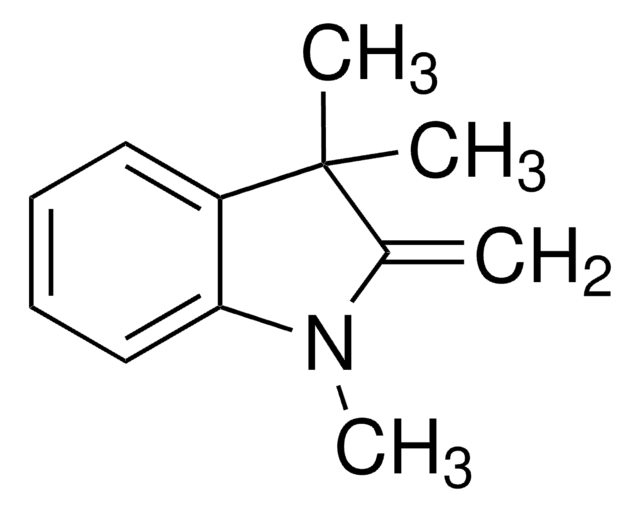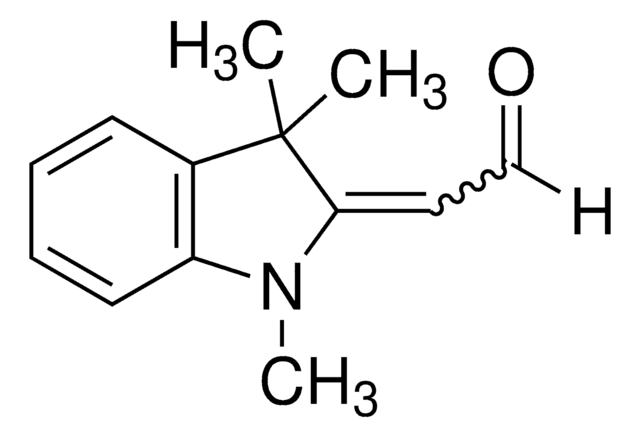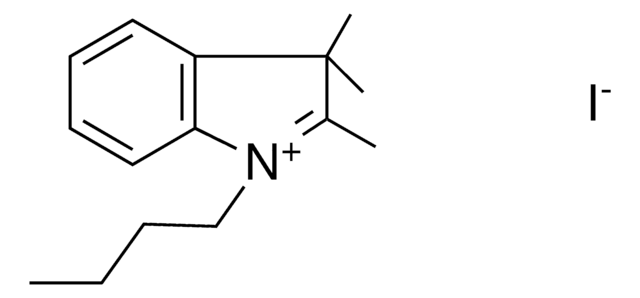T76805
2,3,3-Trimethylindolenine
98%
Synonym(s):
2,3,3-Trimethyl-3H-indole
Sign Into View Organizational & Contract Pricing
All Photos(1)
About This Item
Empirical Formula (Hill Notation):
C11H13N
CAS Number:
Molecular Weight:
159.23
Beilstein:
119740
EC Number:
MDL number:
UNSPSC Code:
12352100
PubChem Substance ID:
NACRES:
NA.22
Recommended Products
Quality Level
Assay
98%
refractive index
n20/D 1.549 (lit.)
bp
228-229 °C/744 mmHg (lit.)
density
0.992 g/mL at 25 °C (lit.)
SMILES string
CC1=Nc2ccccc2C1(C)C
InChI
1S/C11H13N/c1-8-11(2,3)9-6-4-5-7-10(9)12-8/h4-7H,1-3H3
InChI key
FLHJIAFUWHPJRT-UHFFFAOYSA-N
Looking for similar products? Visit Product Comparison Guide
General description
2,3,3-Trimethylindolenine is an indolenine compound used as a reactant in organic synthesis reactions.
Application
- Squarylium-based chromogenic anion sensors.: This research explores the synthesis and application of squarylium-based sensors, which includes 2,3,3-Trimethylindolenine as a crucial component. The study focuses on the effectiveness of these sensors in detecting various anions through chromogenic changes, highlighting the compound′s role in developing advanced chemical sensing technologies (Lee EM et al., 2012).
Signal Word
Warning
Hazard Statements
Precautionary Statements
Hazard Classifications
Eye Irrit. 2 - Skin Irrit. 2 - STOT SE 3
Target Organs
Respiratory system
Storage Class Code
10 - Combustible liquids
WGK
WGK 1
Flash Point(F)
199.4 °F - closed cup
Flash Point(C)
93 °C - closed cup
Personal Protective Equipment
dust mask type N95 (US), Eyeshields, Gloves
Choose from one of the most recent versions:
Already Own This Product?
Find documentation for the products that you have recently purchased in the Document Library.
Customers Also Viewed
Chanuk Jeong et al.
Journal of controlled release : official journal of the Controlled Release Society, 329, 50-62 (2020-12-02)
Near-infrared (NIR)-induced dye-based theranostic drug delivery carriers are used for critical image-guided chemo-photothermal cancer therapy. However, most carriers fail to deliver sufficient heat and fluorescence efficiently due to direct π-π stacking of the aromatic rings of the NIR dye and
The synthesis of 3, 3-dimethyl-2-(1-aryl-1h-pyrazol-4-yl)-3h-indoles
Baradarani MM, et al.
Journal of Heterocyclic Chemistry, 43(6), 1591-1595 (2006)
Juewei Ning et al.
Molecular medicine reports, 15(6), 3761-3766 (2017-04-26)
The future of personalized cancer treatments relies on the development of functional agents that have tumor-targeted anticancer activities and can be detected in tumors using imaging. However, application of these functional agents in the clinic has been limited due to
Ilkoo Noh et al.
Journal of controlled release : official journal of the Controlled Release Society, 320, 283-292 (2020-01-27)
Image-guided therapy, combined with imaging and therapeutic action, forms an attractive system because it can induce outstanding effects at focused locations. However, the conventional liposomes-based system cannot figure in therapeutic or imaging roles themselves, thereby causing the disadvantage of their
Raphael C L Machado et al.
Molecules (Basel, Switzerland), 24(23) (2019-11-27)
Compared to conventional spectroscopy or chromatography analysis, chemical sensing based on colorimetric changes offers an alternative to monitor potential metal hazards in aqueous environment through rapid and low-cost colorimetric changes which can be easily interpreted. In this work poly(ethylene glycol)
Our team of scientists has experience in all areas of research including Life Science, Material Science, Chemical Synthesis, Chromatography, Analytical and many others.
Contact Technical Service

![1,1,2-Trimethylbenz[e]indole ≥98.0% (HPLC)](/deepweb/assets/sigmaaldrich/product/structures/296/735/4c0b92e3-1a5f-4c32-8b5b-0b0997c15df4/640/4c0b92e3-1a5f-4c32-8b5b-0b0997c15df4.png)

![1′,3′-Dihydro-1′,3′,3′-trimethyl-6-nitrospiro[2H-1-benzopyran-2,2′-(2H)-indole] 98%](/deepweb/assets/sigmaaldrich/product/structures/503/745/147ecd2c-44b9-46e9-a8c9-bff9a2577218/640/147ecd2c-44b9-46e9-a8c9-bff9a2577218.png)



![N-[5-(Phenylamino)-2,4-pentadienylidene]aniline monohydrochloride 98%](/deepweb/assets/sigmaaldrich/product/structures/365/246/6dec3589-6c56-4b0a-a3ae-e8d5fbbd3f05/640/6dec3589-6c56-4b0a-a3ae-e8d5fbbd3f05.png)




